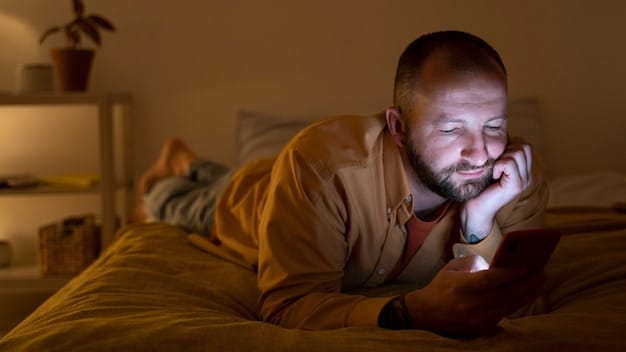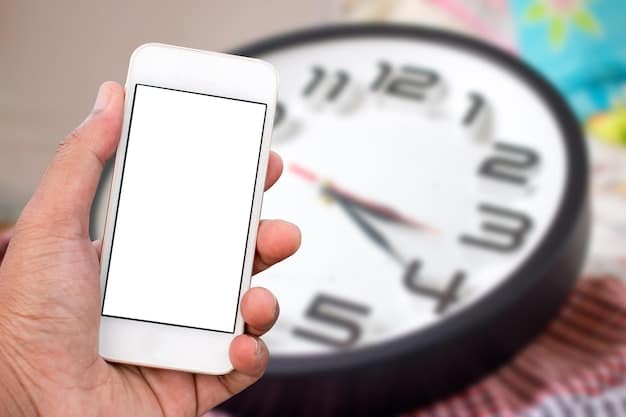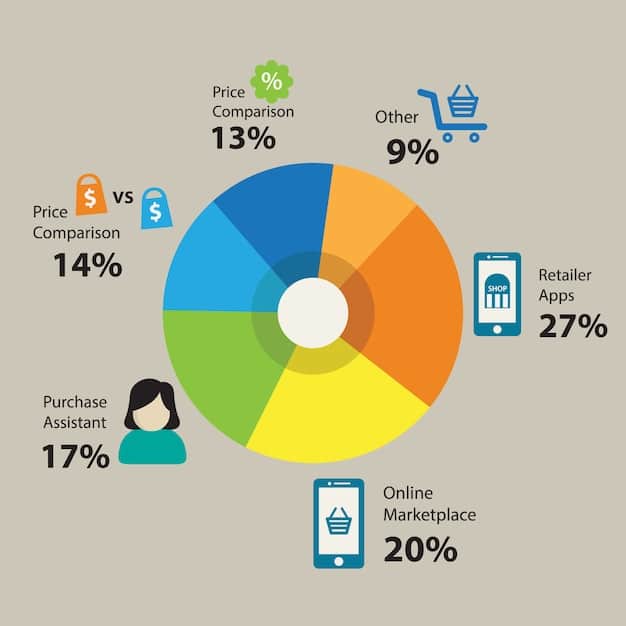Social Media & Sleep: Is Your 2025 Use a Mental Health Risk?

Is your social media use affecting your sleep as we approach 2025? Excessive social media use, especially before bed, can disrupt sleep patterns due to blue light exposure and the stimulating nature of online content, potentially leading to mental health issues.
Are you mindlessly scrolling through your social media feeds late into the night? As we head towards 2025, it’s crucial to consider: is your social media use affecting your sleep?
The Social Media Sleep Connection: Understanding the Impact
Social media has become an integral part of our daily lives, but its impact on our sleep is often underestimated. The constant connectivity and engaging content can significantly interfere with our ability to get a good night’s rest.
Understanding the connection between social media and sleep is the first step towards addressing potential problems. The algorithms are designed to keep us hooked and, as a result, sleep is often the compromise.
The Blue Light Factor
One of the key culprits is the blue light emitted by our smartphones and tablets. This type of light suppresses melatonin, the hormone that regulates sleep. By reducing melatonin production, blue light makes it harder to fall asleep and can disrupt your natural sleep-wake cycle.
The Psychological Impact
Beyond the blue light, social media can also have a psychological impact on our sleep. Exposure to curated content, comparisons with others, and constant notifications can lead to increased stress, anxiety, and a fear of missing out (FOMO). All of these factors can keep your mind racing when you’re trying to unwind for the night.
- Increased stress and anxiety due to comparisons.
- Fear of missing out leading to prolonged screen time.
- The stimulating nature of social media content.

In conclusion, the connection between social media and sleep is complex, but undeniable. Both blue light exposure and the phycological impacts can have serious detriment to sleep.
Identifying Problematic Social Media Habits
Recognizing and identifying problematic social media habits is crucial for mitigating its adverse effects on sleep. It’s about being honest with yourself about how much time you spend online and when you’re most active.
Self-awareness is the first step to positive change.
Assessing Your Screen Time
Most smartphones have built-in features that track your screen time. Take advantage of these tools to see how much time you’re actually spending on social media each day. This data can be an eye-opener and motivate you to cut back.
Analyzing Your Usage Patterns
Pay attention to when you’re using social media the most. Are you scrolling through feeds right before bed? Are you constantly checking notifications throughout the night? Identifying these patterns can help you make targeted changes to your routine.
Try to avoid these patterns that contribute to bad sleep:
- Late-night scrolling.
- Constant notification checks.
- Using social media as a distraction from stress or boredom.

In conclusion, Identifying problematic social media habits is the first step in helping to mitigate its adverse effects on sleep. Knowing how much time you actually spend on social media will help you cut back and find targeted solutions.
Mental Health Implications: Why Sleep Matters
Sleep is not just about feeling rested, it’s also about maintaining good mental health. Chronic sleep deprivation can have serious consequences for our mood, cognitive function, and overall well-being. Understanding these implications can provide additional motivation to prioritize sleep.
Sleep and mental health are intrinsically linked.
The Link Between Sleep and Mood
Lack of sleep can lead to increased irritability, mood swings, and a greater susceptibility to negative emotions. Getting enough sleep, on the other hand, helps regulate your mood and promotes emotional stability.
The Impact on Cognitive Function
Sleep is essential for cognitive processes such as attention, memory, and problem-solving. When you’re sleep-deprived, it becomes harder to concentrate, learn new information, and make sound decisions.
Addressing Pre-Existing Conditions
For individuals with pre-existing mental health conditions, such as anxiety or depression, sleep deprivation can exacerbate symptoms.
A good night’s sleep can significantly affect your:
- Mood
- Cognitive Function
- Ability to handle stress
In conclusion, sleep is not only about feeling rested, but also about maintaining good mental health. Chronic sleep deprivation can have serious consequences for you, such as a poor mood.
Strategies for a Digital Detox Before Bed
To safeguard your sleep and mental well-being in the age of social media, it’s essential to establish boundaries. Creating healthy routines will help you disconnect from the digital world and prepare your mind for rest.
The key is creating a buffer between your screen time and bedtime.
Establishing a Tech-Free Zone
Designate your bedroom as a tech-free zone. Remove all electronic devices, including smartphones, tablets, and TVs. This will help create a sleep-conducive environment that encourages relaxation.
Setting a Cut-Off Time
Establish a clear cut-off time for social media use each night. This could be an hour or two before bed, depending on your needs and preferences. Stick to this cut-off time consistently to train your mind and body to wind down.
Alternative activities
Engage activities such as reading a book or taking a warm bath. Try journaling or meditating. All these activities will get your mind ready for bed.
Some possible bedtime activites:
- Reading a physical book.
- Journaling thoughts and feelings.
- Meditating or practicing deep breathing exercises.
In conclusion, safeguard your sleep and mental well-being by creating a tech free zone and engaging in other activities before bed. Creating helathy routines is key.
Tools and Apps to Monitor and Limit Social Media Use
Fortunately, there are numerous tools and apps available to help you monitor and limit your social media use. These resources can provide valuable insights into your habits and assist you in setting boundaries.
Take advantage of these digital helpers to regain control over your screen time.
Screen Time Trackers
Many smartphones have built-in screen time trackers that show you how much time you’re spending on different apps and websites. These trackers can also send you notifications when you’ve reached your daily usage limits.
App Blockers
App blockers allow you to set time limits for specific social media apps. Once you’ve reached your limit, the app will be blocked, preventing you from mindlessly scrolling for hours.
Website Blocking Extensions
Website blocking extensions work similarly to app blockers, but they target specific websites. You can use these extensions to block social media sites on your computer or laptop during certain hours.
Some effective tools that help you take control of your screen time include:
- Built-in screen time trackers.
- App blockers.
- Website blocking extensions.
In conclusion, take control of your screen time by using tools and app blockers. These resources can provide valuable insights into your habits and assist you in setting boundaries.
Cultivating a Healthy Sleep Environment
Beyond reducing social media use, creating a sleep conducive environment is essential. This involves optimizing your bedroom for relaxation and comfort.
Your bed should be a haven, separate from the stresses of the day.
Optimizing Your Bedroom
Ensure that your bedroom is dark, quiet, and cool. Use blackout curtains to block out external light, and consider using a white noise machine to mask any disturbing sounds.
Investing in Comfortable Bedding
Invest in comfortable bedding, including a supportive mattress, soft pillows, and breathable sheets. The better you can make your bed the better your sleep will be.
Establishing a Consistent Sleep Schedule
Go to bed and wake up at the same time every day, even on weekends. This helps regulate your body’s natural sleep-wake cycle and promotes more restful sleep.
Optimizing your bedroom and establishing a consistent schedule are essential.
- Blackout curtains
- invest in comfortable bedding.
- Consistent sleep schedule
In conclusion, your bed should be a haven, separate from the stresses of the day. By optimizing your bedroom and establishing a consisten schedule you will increase your chances of haveing restful sleep.
| Key Point | Brief Description |
|---|---|
| 📱 Blue Light Effects | Blue light from screens suppresses melatonin, disrupting sleep. |
| ⏰ Tech-Free Time | Establish a tech-free time before bed to wind down naturally. |
| 😴 Sleep Environment | Optimize your bedroom for darkness, quiet, and a cooler temperature. |
| 🧰 Monitor Usage | Use apps and tools to track and limit your social media use. |
FAQ
▼
Social media use before bed can disrupt sleep due to blue light exposure, which suppresses melatonin. It can also increase stress and anxiety, keeping your mind active and making it harder to fall asleep.
▼
Blue light is a type of light emitted by screens that can suppress the production of melatonin, a hormone that regulates sleep. This can lead to difficulty falling asleep and disrupted sleep patterns.
▼
Start by setting a cut-off time for social media use. Engage in alternative activities like reading or meditation. Consider using app blockers to limit your screen time and reduce the temptation to scroll.
▼
Many smartphones have built-in screen time trackers. There are also various apps available that monitor your social media use and send notifications when you’ve reached your daily usage limits, helping you to stay within set boundaries.
▼
A consistent sleep schedule helps regulate your body’s natural sleep-wake cycle, also known as your circadian rhythm. Going to bed and waking up at the same time every day promotes more restful and predictable sleep.
Conclusion
In conclusion, as we approach 2025, being mindful of our social media habits is more critical than ever. By understanding the impact of social media on sleep, identifying problematic usage patterns, and implementing strategies for a digital detox, you can improve your sleep quality and, consequently, your mental health.





